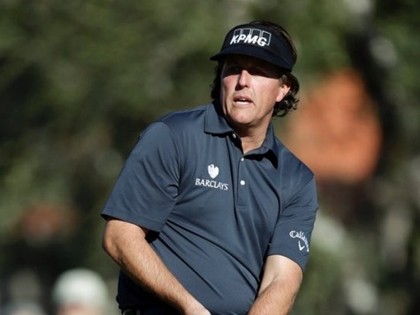Professional golfer Phil Mickelson, who is nicknamed “lefty” because of his left-handed swing, said he is not sure if he can afford to live in California and will have to make some “drastic changes” after the federal government and the state of California raised the rates at which his income is taxed.
Mickelson addressed reporters after the Humana Challenge golf tournament on Sunday in La Quinta, California. He said he would have to make some “drastic changes” and was not sure if he would stay in California. He was not specific about what those “drastic changes” may be, but his words were in response to a question about another golfer’s “semi-retirement.” Mickelson currently resides in San Diego, California.
“If you add up all the federal and you look at the disability and the unemployment and the Social Security and the state, my tax rate’s 62, 63 percent,” Mickelson said. “So I’ve got to make some decisions on what I’m going to do.”
Last November, California voters approved of Proposition 30, which raised the state tax rate for those making more than $250,000. Californians who make over $1 million will now be hit with a 13.3% top tax rate, which is the highest of any state. Previously, those making over $1 million in California were hit with a 10.3% tax rate. Those making $250,000 to $300,000 a year will pay 10.3%, which is up from 9.3%.
To avert the so-called fiscal cliff, Congress and President Barack Obama agreed to raise taxes on individuals and families making $400,000 and $450,000, respectively. Those in the top income bracket will now be hit with a 39.6% tax rate, up from 35%, at the federal level.
“There are going to be some drastic changes for me because I happen to be in that zone that has been targeted both federally and by the state and, you know, it doesn’t work for me right now,” Mickelson said. “So I’m going to have to make some changes.”
Last season, Mickelson earned over $4 million from tournaments alone (Mickelson makes much more in endorsements). Throughout his career, he has earned more than $60 million from tournaments, ranking him second only to Tiger Woods. These tax increases will impact Mickelson.
Here are the relevant portions of the transcript of Mickelson’s exchange with a golf reporter:
Q. When you’re asked about Stricker’s semi‑retirement, with the political situation the last couple months, blah, blah, blah, what did you mean by that? Do you find it an unsettling time in a way?
PHIL MICKELSON: Well, it’s been an interesting offseason. And I’m going to have to make some drastic changes. I’m not going to jump the gun and do it right away, but I will be making some drastic changes.
Q. Meaning leaving from California?
PHIL MICKELSON: I’m not sure.
Q. Moving to Canada?
PHIL MICKELSON: I’m not sure what exactly, you know, I’m going to do yet. I’ll probably talk about it more in depth next week. I’m not going to jump the gun, but there are going to be some. There are going to be some drastic changes for me because I happen to be in that zone that has been targeted both federally and by the state and, you know, it doesn’t work for me right now. So I’m going to have to make some changes.
Q. Is it a stance that you are taking because on the one hand, you’ve made a lot of money, and no matter how much they take out, you are left with a lot of money?
PHIL MICKELSON: Yeah. I’ll probably go into it more next year or next week. But if you add up, if you add up all the federal and you look at the disability and the unemployment and the Social Security and the state, my tax rate’s 62, 63 percent. So I’ve got to make some decisions on what I’m going to do.

COMMENTS
Please let us know if you're having issues with commenting.